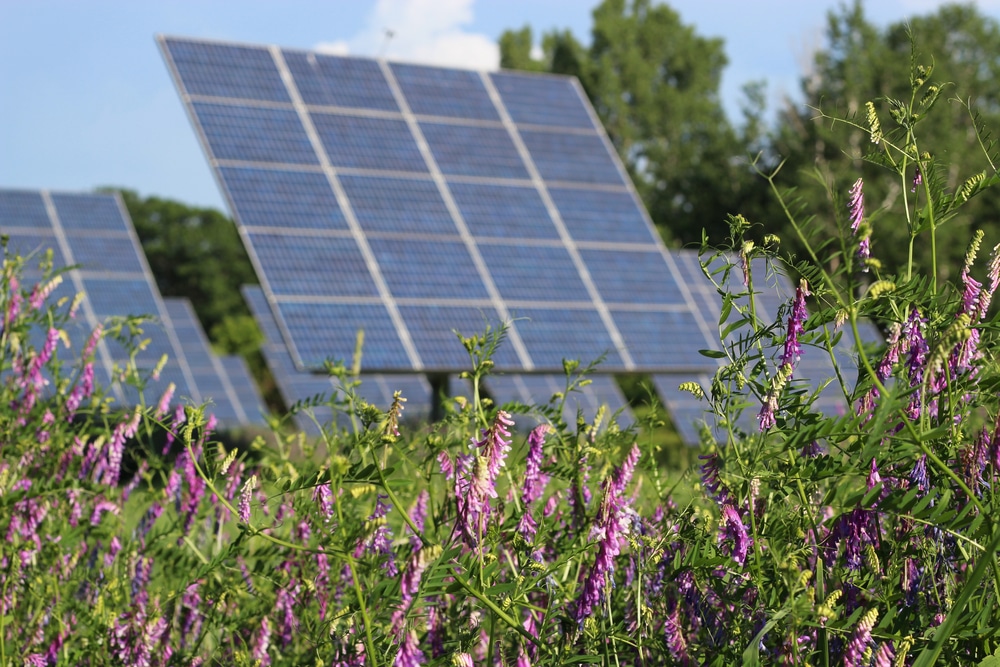Worldwide, bee colonies are collapsing, which poses an enormous problem for food crops and the environment in general. The key to saving the humble bee may be found in solar farms, with British researchers outlining ways that bees can benefit from the renewable energy boom.

Bees are a vital part of our ecosystem as they are a pollinator like other insects, including wasps, beetles, butterflies and moths. In simple terms, a pollinator is an animal that will move pollen and allow plants to create fruit or seeds for reproduction.
Every winter, up to 20 per cent of a bee colony will die off. That number has now increased to up to 90 per cent, and bees are in short supply worldwide. Pesticides, habitat destruction, pollution, drought – there are many reasons why these bees are dying. Many of these can be linked to climate change.
It is not just the lack of these insects that is the issue – the effectiveness of the remaining population is also a problem. Biologists have discovered up to 150 different pesticides in pollen, which is being transferred to plants and food supplies.
Greenpeace has recommended a three-pronged strategy to save the population:
- Ban seven of the most dangerous pesticides
- Preserve wild habitat for bee populations
- Reform the agriculture system
There could be another solution that would be much easier to achieve, though.
How better land management at solar plants can save the bees
Environmental scientists from Lancaster University Environment Centre in northwest England recently teamed up with researchers from the University of Reading. They studied how land management processes at solar farms could benefit pollinator biodiversity.
Their findings were published in the Renewable and Sustainable Energy Reviews journal, and outlined ten ways these farms could protect and enhance pollinator biodiversity. Some of the key findings include:
- Planting wildflowers: This would attract multiple insects, including pollinators.
- Location: Move panels away from agricultural landscapes that are poor for biodiversity.
- Connection: Install these panels near the existing semi-natural habitat.
Moving these parks away from intensively managed agricultural landscapes would enable biodiversity to thrive underneath the panels. University of Reading Professor Simon Potts said biodiverse parks provided positive solutions for farmers and the environment.
“As well as promoting biodiversity, pollinator-friendly parks also have the potential to provide tangible economic benefits to farmers through enhancing pollination services to adjacent agricultural land, boosting crop yields,” he said.
“Imagine a world where solar parks not only produced much-needed low carbon electricity, but were also diverse and attractive wildflower meadows buzzing with insect life.”
Renewable power can also combat predators
Fields of panels will do more than provide a habitat for endangered bees – they will also protect them. The Varroa destructor mite lives and feeds on bees, and they have a devastating impact globally. This particular mite thrives in the cold and hates the heat, so it has been proven that solar-heated beehives will stave off their enemy.
Bee habitats at these farms could easily be powered by the sun and heated, providing a natural line of defence for our pollinator friends.
Want to learn more about bee-friendly solar power? Call us for a free solar quote today.
- Save the Bees
https://www.greenpeace.org/usa/sustainable-agriculture/save-the-bees/#:~:text=Scientists%20know%20that%20bees%20are,pollution%2C%20global%20warming%20and%20more.&text=U.S.%20National%20Agricultural%20Statistics%20show,2008%2C%20a%2060%20percent%20reduction. - Ten ways to ensure bees benefit from solar power boom
https://www.miragenews.com/ten-ways-to-ensure-bees-benefit-from-solar-547246/











































